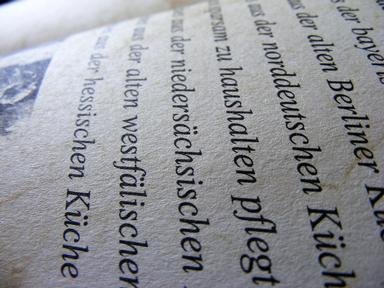Quiz Answer Key and Fun Facts
1. In 1741, William Shenstone (1714-1763), the famous English poet, wrote in a letter: "I loved him for nothing so much as his flocci-nauci-nihili-pili-fication of money." In 1999, while commenting on the death of the Comprehensive Test Ban Treaty (CTBT), the US Senator Jesse Helms said, "I note your distress at my floccinaucinihilipilification of the CTBT."
What meaning does the word 'floccinaucinihilipilification' carry today?
2. There is this possibility that you are an 'antidisestablishmentarian', though you probably don't know it! 'Antidisestablishmentarianism' is another incredibly long word, and is a political philosophy. As the 'anti' prefix will tell you, it is *against* something or the other. But what exactly is it against?
3. 'www.llanfairpwllgwyngyllgogerychwyrndrobwllllantysiliogogogoch.com' is the largest non-hyphenated domain-name on the internet! Anyway, Llanfairpwllgwyngyllgogerychwyrndrobwllllantysiliogogogoch is the name of a small town somewhere in Great Britain, literally meaning "the church of St. Mary in the hollow of white hazel trees near the rapid whirlpool by St. Tysilio's of the red cave". Understandably, the locals call the place simply 'Llanfair' or 'Llanfair PG' or 'Llanfairpwyll'.
And now for the question- in which part of Great Britain would you find the town with this tongue-twister of a name?
4. And it's time for a word which might be familiar to the young ones -- "Abcdefghijklmnopqrstuvwxyz". "Wait!" you may say, "that isn't a word!". Well, according to a certain character from a kids' television show, it is! Which character is this?
5. "Um diddle diddle diddle um diddle ay,
Um diddle diddle diddle um diddle ay,
Supercalifragilisticexpialidocious!
Even though the sound of it Is something quite atrocious,
If you say it loud enough,
You'll always sound precocious,
Supercalifragilisticexpialidocious!"
Today, nobody quite agrees one what exactly the word 'supercalifragilisticexpialidocious' means. Some say it's just a proper noun and has no other meaning, while others say it means "better than the best". Anyway, in which movie did this word first appear?
6. And now it's over to diseases, where we come across another long word (45 letters to be precise)- pneumonoultramicroscopicsilicovolcanoconiosis (sometimes spelt "pneumonoultramicroscopicsilicovolcanoKoniosis"; with a 'K')! Apparently, this disease occurs especially in miners (people working in mines; not 'minOrs', which means 'children').
What part of the body does this disease affect?
7. Dichlorodiphenyltrichloroethane or DDT was once considered a miraculous chemical when it was first invented in 1874 in Germany. What was it used as?
8. "Polytetrafluoroethylene"- another long chemical name; where are you likely to find it?
9. Staying with chemical names, we meet the king of long words- 1,913 letters long! (Some say it's 1,909 letters long, but I don't have the patience to count.)
methionylglutaminylarginyltyrosylglutamylserylleucylphenyl-
alanylalanylglutaminylleucyllysylglutamylarginyllysyglutamyl-
gycylalanylphenylalanylvalylprolylphenylalanylvalylthreonyl-
leucylglycylaspartylprolylglycyllisoleucylglutamylglutaminyl-
serylleucyllysylisoleucylaspartylthreonylleucylisoleucyl-
glutamylalanylglycylalanylaspartylalanylleucylglutamylleucyl-
glycylisoleucylprolylphenylalanylserylaspartylprolylleucyl-
alanylaspartylglycylprolylthreonylisoleucylglutaminylasparaginyl-
alanylthreonylleucylarginylalanylphenylalanylalanylalanyl-
glycylvalylthreonylprolylalanylglutaminylcysteinylphenylalanyl-
glutamylmethionylleucylalanylleucylisoleucylarginylglutaminyl-
lysylhistidylprolylthreonylisoleucylprolylisoleucylglycylleucyl-
leucylmethionyltyrosylalanylasparaginylleucylvalylphenylalanyl-
asparaginyllysylglycylisoleucylaspartylglutamylphenylalanyl-
tyrosylalanylglutaminylcysteinylglutamyllysylvalylglycylvalyl-
aspartylsrylvalylleucylvalylalanylaspartylvalylprolylvalyl-
glutaminylglutamylserylalanylprolylphenylalanylarginylglutaminyl-
alanylalanylleucylarginylhistidylasparaginylvalylalanyl-
prolylisoleucylphenylalanylisoleucylcysteinylprolylprolylaspartyl-
alanylaspartylaspartylaspartylleucylleucylarginylglutaminyl-
isoleucylalanylseryltyrosylglycylarginylglycyltyrosylthreonyl-
tyrosylleucylleucylserylarginylalanylglycylvalylthreonylglycyl-
alanylglutamylasparaginylarginylalanylalanylleucylleucyllysyl-
glutamyltyrosylasparaginylalanylalanylprolylprolylleucylglutaminyl-
glycylphenylalanylglysylisoleucylserylalanylprolylaspartylglutaminyl-
valyllysylalanylalanylisoleucylaspartylalanylglycylalanylalanyl-
glycylalanylisoleucylserylglycylserylalanylisoleucylvalyllysylisoleucyl-
isoleucylglutamylglutaminylhistidylasparaginylisoleucylglutamyl-
prolylglutamyllysylmethionylleucylalanylalanylleucyllysylvalylphenyl-
alanylvalylglutaminylprolylmethionyllysylalanylalanylthreonylarginy-
lserine
Quite overwhelming, isn't it? It is the term for the formula C1289H2051N343O375S. What type of a compound is this chemical?
10. Hmmm...after playing this quiz, I have a feeling you might have developed "hippopotomonstrosesquippedaliophobia". What is this monstrous word the fear of?
Source: Author
achernar
This quiz was reviewed by FunTrivia editor
fringe before going online.
Any errors found in FunTrivia content are routinely corrected through our feedback system.


